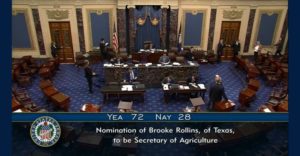 There were a thousand and one reasons to attend the last session of the National Ethanol Conference Wednesday, and one of them was learning about the potential for expanding the global market for ethanol.
There were a thousand and one reasons to attend the last session of the National Ethanol Conference Wednesday, and one of them was learning about the potential for expanding the global market for ethanol.
Exports of U.S. ethanol hit record highs last year and are booming as countries around the world recognize the economic and environmental benefits of American-made renewable fuels.
Renewable Fuels Association General Counsel Ed Hubbard moderated a panel on export opportunities with Everett Eissenstat with Squire Patton Boggs and Ryan LeGrand, U.S. Grains Council President and CEO, to examine the macro-level outlook for global trade under the new Trump Administration, as well as specific challenges and opportunities for expanding ethanol exports.
Eissenstat, a renowned global trade expert who has served in senior positions in Congress, the Office of the US Trade Representative, and the White House, said President Trump’s focus on trade reciprocity may help U.S. ethanol producers in some markets. “Brazil has a very unfair tariff barrier on U.S, ethanol…they’ve got an 18% tariff, which really has crushed the market in Brazil,” he said. “There’s also retaliatory tariffs in China. Maybe there could be some negotiations open that market up as well.”
LeGrand talked about the great potential for U.S. exports of ethanol and distillers grains and said the Grains Council is considering a name change to reflect that. “Ethanol market development makes up about 35% of our total budget and for the last couple of years I’ve been saying that ethanol is part of our identity and practice, but not in name. Which is why we have just recently asked our membership to consider an amendment to our organizational name to become the US grains and Bio Products Council to include ethanol.”
USGC membership will be voting on the name change in August.
Listen to the panel and a press interview with LeGrand here:
RFANEC Expanding Exports panel (45:18)
Ryan LeGrand, U.S. Grains Council (5:24)












